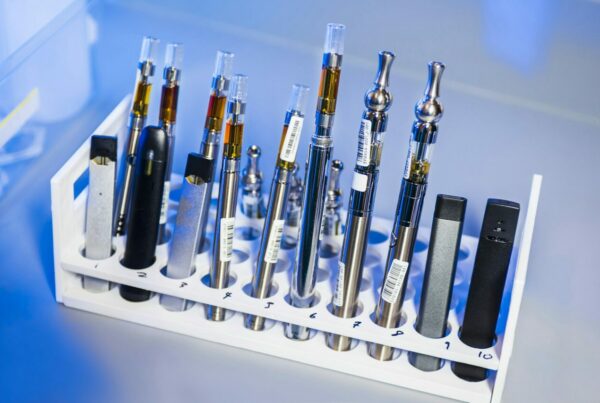N, N-Dimethyltryptamine (DMT) is a compound commonly found in both plants and animals, known for its brief yet powerful psychedelic effects upon intake.
Emerging research suggests that DMT, which naturally exists in the body, plays important roles in our peripheral and central nervous systems and may operate as a neurotransmitter.
DMT can provoke strong psychedelic effects, although it typically does not cause many negative effects, aside from potential cardiovascular complications when given in high doses through injection.
Let’s explore DMT and its diverse roles, ranging from recreational use to its promising potential in scientific studies and therapeutic uses.

A Brief Introduction to DMT: What Is It?
| Characteristic | Information |
| Name | N, N-Dimethyltryptamine (DMT) |
| Type | Indole alkaloid |
| Presence | Naturally found in a variety of plants and animals |
| Psychoactive Effects | Produces short, intense psychedelic experiences upon consumption |
| Consumption Methods | Can be smoked, injected, or consumed orally |
| Effect Duration | Effects are brief, typically lasting between 5 to 30 minutes |
| Chemical Structure | A tryptamine core with two methyl groups attached to the nitrogen atom of the amine |
| Metabolism | Rapidly metabolized by the body, broken down by monoamine oxidase (MAO) |
| Cultural Use | Traditionally used in various ceremonial and shamanic rituals by indigenous cultures |
| Alternative Names | Dimitrifantasia, businessman’s trip, Businessman’s special, 45-minute psychosis, spiritual molecule |
DMT’s Role in Mental Health
N, N-Dimethyltryptamine (DMT), a compound famed for its potent psychedelic effects, is gaining attention for its potential benefits to mental health. Despite its conventional reputation for inducing profound visionary experiences, recent research suggests a connection between DMT and mental well-being.
Influence on Psychological and Emotional Holistic Health
DMT’s psychedelic effects are renowned for sparking deep emotional reactions and altering states of consciousness. This could potentially pave the way for therapeutic interventions to address mental health concerns, assist in emotional processing, and offer new perspectives on personal traumas.
Brain Function and Neuroplasticity
Research suggests that DMT could influence neuroplasticity, thereby enhancing the brain’s ability to adapt and reorganize itself. Investigating its effects on synaptic plasticity and neural connectivity might offer promising treatments for conditions associated with neural maladaptation.
Potential Therapeutic Applications for Mental Health Disorders
Early research emphasizes DMT’s potential in treating disorders such as depression, addiction, and PTSD. Its ability to provoke mystical or spiritual experiences could introduce a novel approach to psychotherapy and aid in reconfiguring negative thought patterns.
Investigations into the natural presence of DMT within the body underscore its role in mental health resilience, stress response, and overall psychological well-being. Understanding how the body controls internal DMT levels could herald new therapeutic strategies.
DMT’s Role in Mental Health Disorders
| Mental Health Disorder | Description | Effectiveness of DMT | Advantages |
| Depression | A mood disorder characterized by persistent sadness, lack of interest, and reduced motivation | Initial research suggests DMT may help alleviate symptoms by prompting deeply emotional experiences. | Its rapid onset and ability to provoke transformative experiences could offer innovative therapeutic approaches for reshaping negative thought patterns and enhancing emotional processing |
| Post-Traumatic Stress Disorder (PTSD) | A mental health condition triggered by traumatic events, leading to flashbacks, severe anxiety, and intrusive thoughts | Preliminary research indicates the potential of DMT to manage symptoms by provoking spiritual or mystical experiences that could help patients reframe traumatic memories | DMT’s potential to stimulate altered states of consciousness could assist in facilitating emotional processing and offer a fresh perspective on traumatic experiences |
| Addiction | A complex disorder characterized by compulsive engagement in rewarding stimuli despite adverse consequences | Some research suggests DMT might play a role in breaking addictive patterns and reducing substance cravings | DMT’s ability to provoke intense and transformative experiences may help individuals modify their behavioral patterns and address underlying factors behind their addiction |
Approaches to Utilizing DMT
DMT, renowned for triggering short yet potent psychedelic episodes, can be administered in multiple ways. The chosen method often depends on the desired intensity and length of the trip.
Inhalation:
DMT, when inhaled using a pipe or vaporizer, demands precise temperature control to avoid overheating and combustion of the compound. A psychedelic trip starts almost instantly upon inhaling DMT, typically lasting for a period of 5 to 15 minutes.
Oral Consumption:
Oral consumption of DMT leads to slower onset effects which endure substantially longer, often for several hours. This is due to the slower decomposition of DMT when combined with an MAOI.
Injection:
DMT can be directly injected into the bloodstream for quick and potent effects.
This approach results in an immediate and strong experience, however it requires precise dosage measurement and carries greater risks.
Insufflation (Snorting):
Snorting DMT initiates a slower onset of effects compared to inhalation, but can provide a more prolonged experience.
Sublingual or Buccal Administration:
When absorbed through the oral mucosa, this method serves as an alternative to inhalation and offers a longer, albeit less intense, trip.
Determining Therapeutic Dosage: N, N-Dimethyltryptamine (DMT)
For inhalation, the suggested dosage ranges from 20 to 40 mg, while for intravenous application, the recommended dosage is 0.2 to 0.4 mg per kg of body weight. These dosage recommendations primarily apply to clinical studies, particularly in the case of intravenous application.
- Higher doses administered intravenously are associated with intense visuals, temporary loss of control, and a state of anxiety mixed with euphoria
- Interestingly, lower doses have exhibited less favorable effects
- Recreational doses of inhaled DMT usually range from 40 to 50 mg, occasionally even going up to 100 mg
- Different doses of intravenous People who have had near-death experiences associated with DMT (7, 14, 18, and 20 mg solutions) reported experiencing lasting and positive improvements in their psychological well-being.
Availability of DMT
ProductsOsmosis – 4-ACO-DMT Ethereal Essence Tincture
This tincture is marketed as containing 4-Acetoxy-N, N-dimethyltryptamine (4-AcO-DMT), a variant of DMT. Tinctures are liquid extracts designed for oral ingestion. This particular product may offer an experience different from standard DMT.
Lucid Supply Co. – 5-MeO DMT Vaporizer
This product is a vaporizer that delivers 5-Methoxy-N, N-dimethyltryptamine (5-MeO-DMT). The active ingredient, 5-MeO-DMT, is known for its potent, transformative, and often short-lived experiences.
Integral Alchemist – Acacia – 1ml DMT Vape Cartridge
The DMT vape cartridge from Integral Alchemist is pre-filled with N, N-Dimethyltryptamine. It is likely designed for those who prefer a discreet and convenient way of consuming DMT.
Deadhead Chemist – 5-Meo-DMT Cartridge
This cartridge houses the compound 5-Methoxy-N, N-dimethyltryptamine (5-MeO-DMT), known for its deep and potent effects.
The potential mental health benefits may be linked to personal growth, spiritual experiences, or therapeutic uses aimed at enhancing emotional well-being.
Deadhead Chemist – N, N DMT Cartridge
Another offering from Deadhead Chemist, this cartridge contains the traditional N, N-Dimethyltryptamine. Cartridges provide a user-friendly way of consuming DMT, ensuring a more consistent and controlled experience.
Concluding Thoughts
The usage of N, N-Dimethyltryptamine (DMT) in
How can you become more acquainted with DMT products?
Mental health therapy brings an exhilarating yet complex journey. The substance’s ability to stimulate intense, yet brief, psychedelic experiences opens up new therapeutic possibilities.
Preliminary research indicates its potential application in emotional management, personal development, and possibly
The profound influence of mental health treatment necessitates careful reflection and prudent application.
Those keen on exploring DMT products in a responsible manner can turn to reliable sources like Magic Mush Canada Online Dispensary for guidance and a variety of options.
Frequently Asked Questions:
What differentiates the impact of various DMT products on mental health?
For instance, vaporizers may yield immediate effects, while tinctures or vape cartridges could provide more controlled and steady doses.
Incorporating derivative compounds or 5-MeO-DMT can result in varying intensities and diverse effects on mental health.
These slight differences underscore the importance of selecting a DMT product based on individual needs and mental health goals.
Can DMT contribute to enduring changes in mental health and personal growth?
There is anecdotal evidence that suggests experiences triggered by DMT could have long-term effects on mental health and personal evolution.
Profoundly impactful or transformative experiences, such as those similar to near-death incidents, are frequently associated with reports of sustained positive changes in psychological wellbeing and personal development.
Despite these experiences being intense and transient, they often lead to introspection, spiritual revelations, and a sense of unity or enlightenment.
Users frequently report a refreshed perspective on life, higher emotional resilience, and a greater sense of life appreciation following these experiences.
What is the most effective method for employing DMT for mental health reasons?
It is crucial to make well-informed decisions, which involve thorough research and a clear understanding of the compound’s effects.
Advice from mental health professionals or seasoned users can provide valuable insights into the potential risks and benefits.
Understanding personal tolerance and mental readiness is also vital, along with ensuring a supportive and safe atmosphere for the experience.
How does DMT stack up against other psychedelic treatments such as psilocybin or LSD in the realm of mental health therapy?
DMT’s effects, duration, and intensity set it apart from other psychedelics like psilocybin or LSD. Its shorter duration…
High intensity, short-acting psychedelics like DMT offer unique experiences, necessitating distinct therapeutic approaches in mental health, different from those applied to longer-lasting psychedelics.
Recommended Additional Reading:





